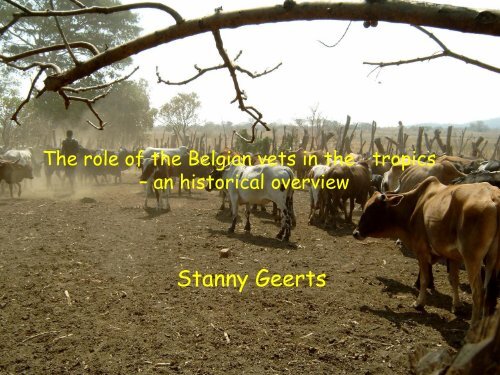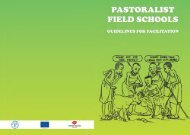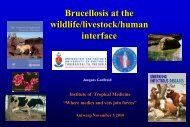Stanny Geerts
The role of the Belgian vets in the tropics â historical overview
The role of the Belgian vets in the tropics â historical overview
- No tags were found...
You also want an ePaper? Increase the reach of your titles
YUMPU automatically turns print PDFs into web optimized ePapers that Google loves.
The role of the Belgian<br />
<strong>Stanny</strong><br />
vets in<br />
<strong>Geerts</strong><br />
the tropics<br />
– an historical overview<br />
<strong>Stanny</strong> <strong>Geerts</strong>
Dr. vet. M. Mammerickx<br />
Prof. Dr. vet. J. Mortelmans
Contents<br />
• Before 1960/1962: colonial vets in Belgian<br />
Congo and Rwanda-Urundi<br />
– Some highlights<br />
• After 1960/62: vets in development<br />
projects all over the world<br />
– Some highlights<br />
• Tropical veterinary medicine in Belgium<br />
today
Epizootics of Rinderpest caused huge losses in<br />
livestock in Africa in the 19th and 20th centuruy
Rinderpest<br />
• Epizootics in Belgian Congo and Ruanda-Urundi<br />
– 1920-24 and 1930-36: large epizootics<br />
– Between 1938 and 1957: several smaller epizootics<br />
• Control by hyperimmune serum (method of DBT:<br />
Danysz, Bordet & Theiler)<br />
– Jules Bordet: Belgian medical doctor, Nobel Prize<br />
1919)<br />
• Many colonial vets have been involved in the<br />
production of immune serum against rinderpest<br />
Mammerickx, 2003. Ann. Méd. Vét. 147: 197-205.
Belgian vets involved in first veterinary<br />
faculties in Latin America and Africa<br />
• Veterinary School of Santa Catalina (Argentina)<br />
– Established in 1883<br />
– 3 Belgian vets: C. Tombeur, D. Bernier, C. Lambert<br />
– 1906: annexed by University of La Plata<br />
• Veterinary School of Abouzabel (Egypt)<br />
– Established in 1828<br />
– 2 Belgian vets: A. Prétot, P. Hamont<br />
– School disappeared in 1849
Eugene Meuleman<br />
the first Belgian vet in Congo<br />
• Born in Jodoigne in 1865<br />
• Graduated as vet in Cureghem<br />
• 1889: appointed by King Leopold II as veterinarian of<br />
the Independent Congo State<br />
– Livestock transport between Matadi and Leopoldville<br />
• Regular meat supply for the railway workers<br />
• 1906: first and only vet at the School of Tropical<br />
Medicine, Brussels<br />
• Publications:<br />
– Meuleman (1895). Etude sur l’élevage des animaux domestiques au<br />
Congo.<br />
– Lancaster & Meuleman (1898). Le climat du Congo.
Colonial vets<br />
in Belgian Congo and Ruanda-Urundi<br />
• Between 1885 and 1962: in total about 230 vets<br />
– Not enough Belgians<br />
– Vets from Switzerland, Italy, Poland, Greece, etc.<br />
– Increasing numbers<br />
• Between 1908-1914: about 20<br />
• Between the 2 world wars: about 60<br />
• Between 1945-60: about 150 (90 Belgians, 60 foreigners)<br />
• Entire colonial career: 31 year + 6 months<br />
– Consisting of 9 periods of 3 years and 9 leaves of 6 months<br />
– Most vets who were engaged between 1920-30 have completed 31.5<br />
years
Role of vets<br />
in the former Belgian colonies<br />
• Provincial veterinary officers (direction<br />
provinciale des services vétérinaires)<br />
– Responsible for regions often larger than<br />
Belgium<br />
• Heads of veterinary laboratories<br />
– Some vets had to build their lab from scratch<br />
• Private sector:<br />
– Vets in charge of big ranches (2000 to 5000<br />
heads of cattle)
Achievements of vets<br />
in the former Belgian colonies<br />
• Main focus on large ruminants<br />
• Excellent veterinary extension services<br />
in Rwanda-Urundi, Kivu and Ituri<br />
– Considered as a model for the whole of<br />
Africa<br />
• 1960: Belgian Congo and Rwanda-Urundi:<br />
selfsufficient for beef!
Watutsi cattle in Kisenyi 1957<br />
Livestock competition
René Van Saceghem<br />
1884-1965<br />
• Military vet<br />
• Head of the first laboratory<br />
of bacteriology at Zambi in<br />
Belgian Congo<br />
• 1914: discovered<br />
Dermatophilus congolensis<br />
• Research on rinderpest,<br />
trypanosomiasis, ECF, etc.<br />
• 57 publications in Bulletin<br />
Agricole du Congo Belge<br />
• 35 publications in Ann. Soc.<br />
Belge Méd. Trop.
Lesions caused<br />
by Dermatophilus congolensis*<br />
*: bacterium, not fungus
Jos Mortelmans<br />
1924-2005<br />
• Colonial vet (1952-59)<br />
– laboratories of Kisenyi,<br />
Elisabethville, Stanleyville and<br />
Astrida<br />
• 1959: started Veterinary<br />
Department at ITM, Antwerp<br />
• One of the founding fathers<br />
of ITC*, Banjul<br />
• President-founder of Agri-<br />
Overseas/ Tropicultura<br />
• Trained 615 students in<br />
tropical vet medicine<br />
• 262 scientific publications<br />
– Trypanosomiasis, zoo animals,<br />
zoonoses, parasitology<br />
*: International Trypanotolerance Centre
After the independancy of Congo<br />
and Rwanda-Urundi (1960/1962)<br />
• Development aid to the former colonies<br />
and many other third world countries<br />
– Development Projects<br />
– Support to veterinary services in DCs<br />
– Support to veterinary faculties in DCs<br />
• In Belgium<br />
– Undergraduate Training of vets from DCs<br />
– Postgraduate Training of Belgian and DC vets<br />
• Establishment of a large number of NGO’s<br />
– i.a. Vétérinaires sans frontières (1994)<br />
DC: developing country
ASVEZA project<br />
1982-2002<br />
• Assistance to the veterinary services of Zambia<br />
(formerly BADCP-Belg. Anim. Dis. Contr. Proj.)<br />
• One of the biggest and longest lasting projects in the<br />
veterinary field<br />
– Financed by the Belg Developm Admin<br />
– Supervised by the vet dept of ITM, Antwerp<br />
• At peak activity: 10 Belgians among whom 4 vets<br />
• Focus on East Coast fever and trypanosomiasis<br />
control<br />
• Very successful<br />
• Reduction of calf mortality from > 25 % until 2.5 %<br />
• Capacity building and training
VVOB* support<br />
to the Veterinary Services of Malawi<br />
• 1990s: lack of manpower in Malawi Vet Services<br />
– Request of Malawi Govnt to VVOB to send vets<br />
• VVOB sent 7 Flemish vets<br />
– Function: PVO or DVO (Project or District Veterinary<br />
Officers)<br />
– Operating funds: those available within Malawi Vet Services<br />
• Almost nihil<br />
• Plus 250 € per year from VVOB!<br />
• Policy of VVOB in 1990s: providing manpower (without<br />
financial support)<br />
– Policy did change in the meantime<br />
• Project in Malawi was stopped after a few years<br />
*: VVOB: Flemish Association for Development Cooperation and Technical Assistance
BELGIAN SUPPORT TO VETERINARY<br />
FACULTIES IN THE TROPICS *<br />
• Institut Agronomique et Vétérinaire Hassan II<br />
(Morocco)<br />
• Faculté Vétérinaire (Lubumbashi, D.R Congo)<br />
• Ecole Inter-Etats des Sciences et Médecine<br />
Vétérinaires (Dakar, Senegal)<br />
• School of Veterinary Medicine (Lusaka, Zambia)<br />
• Faculty of Veterinary Science (Pretoria, South<br />
Africa)<br />
• College of Agriculture and Veterinary Medicine<br />
(Jimma, Ethiopia)<br />
*: non exhaustive list
TROPICAL VETERINARY MEDICINE<br />
TODAY<br />
• Belgium focuses development cooperation in<br />
smaller number of countries<br />
• Smaller number of veterinary projects than<br />
before (integration in rural development)<br />
– Increasing number of vets from DC<br />
– Decreasing number of Belgian vets<br />
• In Belgium:<br />
– Postgraduate training of vets, mainly from DC<br />
– Belgian vets: Junior programme* of BTC<br />
– Loss of expertise in tropical veterinary medicine<br />
*: Vrijwillige dienst ontwikkelingssamenwerking (VDOS)
MAIN BELGIAN PLAYERS IN THE<br />
TROPICAL VETERINARY FIELD TODAY<br />
• Vétérinaires sans frontières/<br />
Dierenartsen zonder grenzen (Belgium)<br />
• Institute of Tropical Medicine, Antwerp<br />
• Institut Vétérinaire Tropical, Liège &<br />
Gembloux<br />
• Belgian Platform on tropical animal<br />
health and production (be-troplive)
Vétérinaires sans frontières<br />
Dierenartsen zonder grenzen<br />
• Established in 1994<br />
• Projects in 8 African countries<br />
•Important contribution to rinderpest eradication<br />
• currently 19 vets involved of whom 12 Africans
Institut Vétérinaire Tropical<br />
Fac Méd Vét, Gembloux,ULg<br />
• Master Complémentaire (MC) interuniversitaire<br />
en gestion des ressources<br />
animales et végétales en milieux<br />
tropicaux (in french).<br />
• Three options:<br />
– animal production<br />
– plant production<br />
– wildlife maangement
Institute of Tropical Medicine<br />
Antwerp<br />
• Master in Tropical Animal<br />
Health<br />
– Alternating in French<br />
and English<br />
• PhD training<br />
• Short training course<br />
‘Quantitative Risk<br />
Assessment’<br />
• Distant learning (in coll.<br />
with Fac Vet Sci, Pretoria)
Belgian Platform on tropical<br />
animal health and production*<br />
• Established in 2006<br />
• Informal and<br />
multidisciplinary<br />
platform<br />
• Open to institutional<br />
and individual members<br />
involved in tropical<br />
animal health and<br />
production<br />
• Mission statement<br />
– Exchange information<br />
– Stimulate joint<br />
actions<br />
– Increase visibility<br />
– Improve coherence<br />
– strengthen relations<br />
with agricultural and<br />
medical sector<br />
*: financially supported by DGD.
WORKSHOPS AND SYMPOSIA<br />
• 2006: Strenghtening livestock services in the<br />
tropics<br />
• 2007: Sustainable livestock production in the<br />
tropics<br />
• 2008: Integrating livestock in farming<br />
systems<br />
• 2009: Socio-economic approaches in livestock<br />
production in the tropics<br />
• 2010: Where medics and vets join forces
THANKS<br />
FOR YOUR ATTENTION





